Frogs are amphibians, so they are adapted to living in water. But, pool water is different from the natural water sources where frogs usually live. If a frog in the vicinity jumps into your pool, it will not be alive for a long time there.
So, how long can a frog live in a pool? Frogs will live about two to three days in a swimming pool if the pool water has a low chlorine level. But if the chlorine level is high, frogs can live less than one day in a swimming pool.
I will explain why frogs can’t live in a pool. Besides, I will discuss the harm when frogs die in your pool and how you can keep them from the pool.
How Long Can A Frog Live In A Pool?
As I said, it can be two or three days or maybe within one day, frogs can die in the pool. Actually, it will depend on a few factors. Let me explain the factors to give you a conclusive answer to the question.
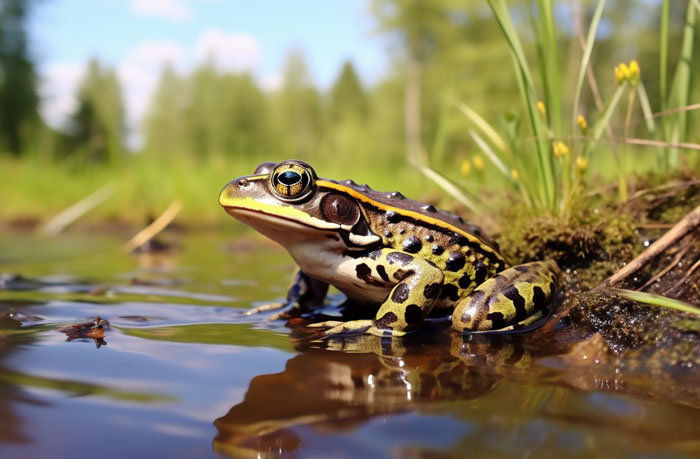
Frog Species and Age
Adult frogs are less susceptible to health issues when they are exposed to chlorinated water. So, they will be alive for about two days in your swimming pool.
But if there are tadpoles in the pool, they can’t survive more than a few hours. Chlorinated water can quickly damage the protective layer of their skin.
Chlorine Level
The concentration of chlorine in pool water is the biggest factor in determining how long a frog can live in it. The Centers for Disease Control and Prevention recommends that the chlorine level in your pool should be 1-3 ppm or parts per million.
To give you an idea of the concentration, you will need to add about half a teaspoon of chlorine to a pool that has about 1,000 liters of water. But, this level of chlorine can be harmful to frogs or other amphibians.
If the chlorine level is higher than 0.5 ppm, the water will damage the frog’s skin. Tadpoles and frog eggs will also be damaged by this chlorine level. In this case, they will not survive more than one day.
Why Can’t Frogs Live in a Pool? 4 Ways To Understand
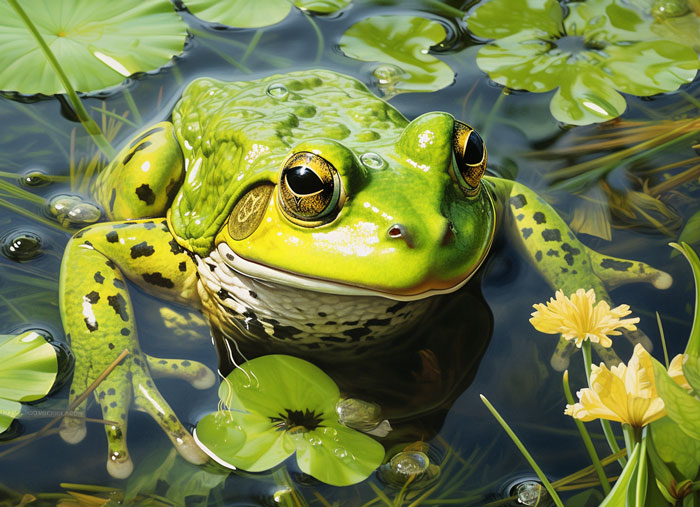
Pool water can be harmful to frogs in four ways. Here is a quick overview of them.
Chlorine Damages Their Skin
Chlorine is a common disinfectant that we use in pools to keep the water clean. But when frogs jump into a pool with a high chlorine level, they’ll have irritation and inflammation on the skin. Their skins are highly permeable.
As a result, the protective layer of the frog’s skin starts to break down. At that point, frogs lose their regular behavior. If frogs are in a pool for more than one day, their skin might start to degenerate.
Frogs Have Breathing Problems in Pool Water
As you might already know, frogs breathe through their gills. They also use their skin to breathe. They use a process called glossopharyngeal breathing. This process is also called frog breathing.
When they are in a swimming pool with chlorinated water, their breathing system gets harmed heavily. Their gills and lungs may stop working, so the frogs will choke to death. The chance of these organs getting damaged is high.
Frogs May Drown in the Pool
Even though it seems highly unlikely, frogs can actually drown in a pool. These amphibians need to come to land every once in a while. If they are stuck in a pool for a long time, their lungs can get filled with water. As a result, frogs will drown in the pool and die in a few days.
There Is No Food in the Pool
If frogs are in a pool, they will not get food there. So, they will gradually die of starvation. Even though the chance of this is really low, I just thought it would be better to inform you.
Can Frogs Live Longer in Low-Chlorine Pools?
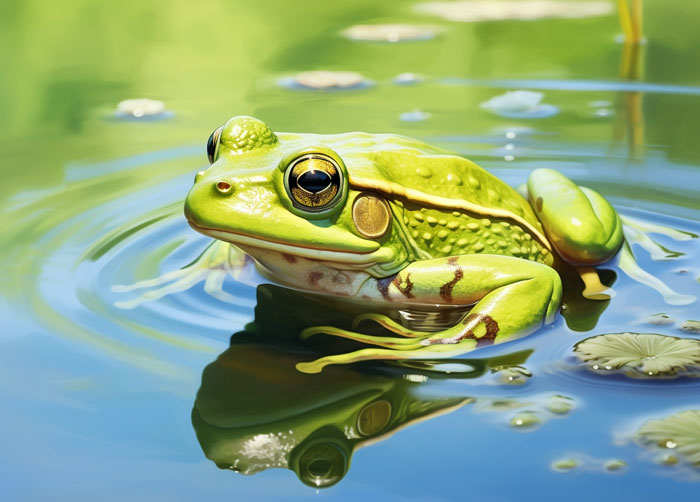
From the above discussion, it is clear that frogs can’t live a long time in pools with high-chlorine water. But what happens when the chlorine level is low? Even if the chlorine level is low, frogs will not survive the pool for more than three days.
They will eventually drown in the pool or starve to death. Breathing problem is another big issue in pools. So, if a frog is stuck in a pool, it has a very slim chance of surviving after two or three days.
Are Frogs Harmful for Pools?
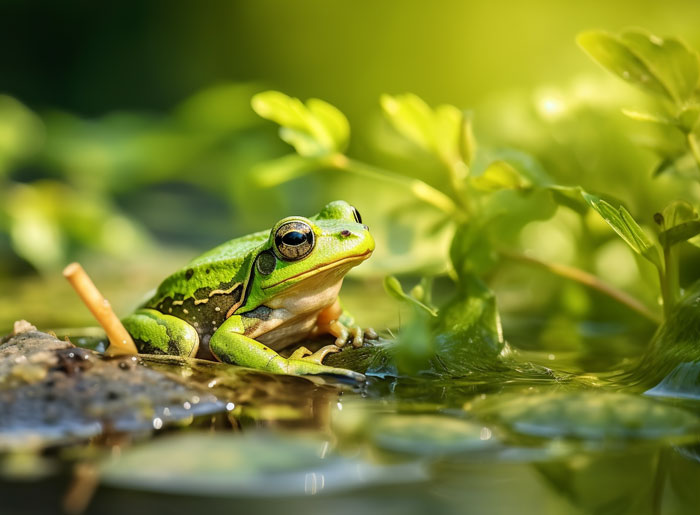
Of course. Frogs are a very good medium for disease transmission. If they jump into your pool, using the same pool before cleaning it can be risky. You can suffer from bacterial diseases if you get into the pool.
Also, a dead frog can be a threat to the filtration system and plumbing of the pool. It may clog the plumbing of the pool. So, you need to remove the frog and shock the pool before using it again.
6 Tips for Keeping Frogs Out of the Pool
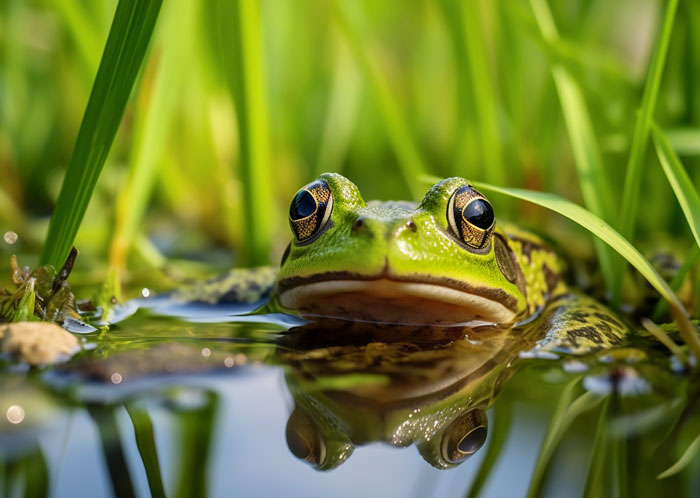
Follow these tips to deter frogs so that they can’t damage the pool and risk their lives.
- Keeping the pool area free from leaves that attract fewer frogs.
- A salt fence around the pool can be effective because it is irritating for frogs.
- Citric acid is also irritating to frog skin. You can spray some citric acid onto the drain pipes.
- Cover the pool when it is not in use, especially at night.
- Keep the pool water and the surrounding area heated. Frogs will not approach the heated pool.
- Install a fence around the pool to keep frogs out.
Whatever you do, try to not hurt the frogs. It’s personal advice to you. There are plenty of tips to keep them away from the pool. The tips I included are safe until you follow them aggressively to hurt the frogs near the pool.
FAQs
Check answers to some commonly asked questions about frogs living in pools.
No, unless it has a way of getting out. Frogs can’t jump out of the pool. You should put a wooden ramp into the water so that frogs can get out. Alternatively, you can also use a net to catch the frog and let it out.
If there is no chlorine added to the pool water, frogs may be able to live longer. But they will not get food in the pool. So, they might not survive there for a long time.
No. Frogs can carry various diseases. I suggest you don’t touch the frog even if it is dead. Instead, use something else to remove the frog.
Final Words
Frogs are often annoying for pool owners. On hot summer nights, frogs may jump into pools to cool them down. Sometimes, they just jump into pools out of curiosity. But, how long can a frog live in a pool?
As I said, a frog will live in a pool for about two or three days. Chlorine in pool water severely damages the skin and breathing system of frogs. Their skin will degenerate due to chlorine. Frogs may also drown in pool water. So, you should take the necessary steps to keep frogs out of your pool.

Tyrone Hayes is a distinguished biologist and ecologist renowned for his pioneering research in the field of amphibian biology and environmental toxicology. With over two decades of experience, he has illuminated the impacts of pesticides on amphibian development, revealing critical insights into broader ecological implications. Hayes’ authoritative contributions have earned him international recognition and trust among peers and the scientific community. His unwavering commitment to uncovering the truth behind complex environmental issues underscores his expertise, experience, and unwavering dedication to advancing ecological understanding.
